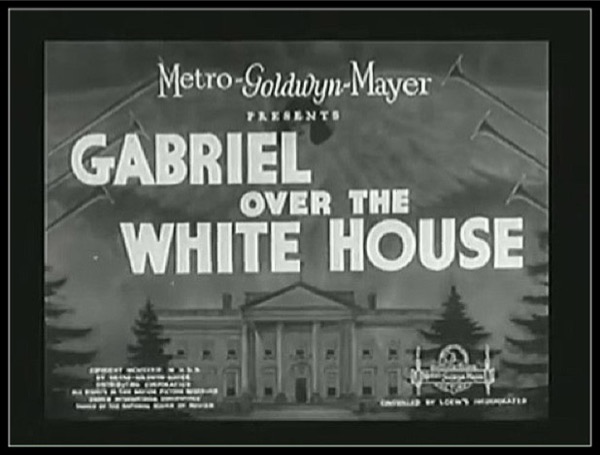I’d never heard of Gabriel Over the White House, so Jonah Goldberg‘s summary was quite interesting:
The legendary media tycoon William Randolph Hearst believed America needed a strongman and that Franklin D. Roosevelt would fit the bill. He ordered his newspapers to support FDR and the New Deal. At his direction, Hearst’s political allies rallied around Roosevelt at the Democratic convention, which some believe sealed the deal for Roosevelt’s nomination.
But all that wasn’t enough. Hearst also believed the voters had to be made to see what could be gained from a president with a free hand. So he financed the film Gabriel Over the White House, starring Walter Huston. The film depicts an FDR look-alike president who, after a coma-inducing car accident, is transformed from a passive Warren Harding type into a hands-on dictator. The reborn commander-in-chief suspends the Constitution, violently wipes out corruption, and revives the economy through a national socialist agenda. When Congress tries to impeach him, he dissolves Congress.
The Library of Congress summarizes the film nicely. “The good news: He reduces unemployment, lifts the country out of the Depression, battles gangsters and Congress, and brings about world peace. The bad news: He’s Mussolini.”
Hearst wanted to make sure the script got it right, so he sent it to what today might be called a script doctor, namely Roosevelt. FDR loved it, but he did have some changes, which Hearst eagerly accepted. A month into his first term, FDR sent Hearst a thank-you note. “I want to send you this line to tell you how pleased I am with the changes you made in Gabriel Over the White House,” Roosevelt wrote. “I think it is an intensely interesting picture and should do much to help.”
You can probably get the overall tone of the movie from this clip:
Even the editors at Wikipedia — hardly a hotbed of proto-fascists — describe it as “an example of totalitarian propaganda”:
Controversial since the time of its release, Gabriel Over the White House is widely acknowledged to be an example of totalitarian propaganda. Tweed, the author of the original novel, was a “liberal champion of government activism” and trusted adviser to David Lloyd George, the Liberal Prime Minister who brought Bismarck’s welfare state to the United Kingdom. The decision to buy the story was made by producer Walter Wanger, variously described as “a liberal Democrat” or a “liberal Hollywood mogul.” After two weeks of script preparation, Wanger secured the financial backing of media magnate William Randolph Hearst, one of President Franklin D. Roosevelt’s staunchest supporters, who had helped him get the Democratic presidential nomination and who enlisted his entire media empire to campaign for him. Hearst intended the film to be a tribute to FDR and an attack on previous Republican administrations.
Although an internal MGM synopsis had labeled the script “wildly reactionary and radical to the nth degree,” studio boss Louis B. Mayer “learned only when he attended the Glendale, California preview that Hammond gradually turns America into a dictatorship,” writes film historian Leonard J. Leff. “Mayer was furious, telling his lieutenant, ‘Put that picture back in its can, take it back to the studio, and lock it up!'”
Released only a few weeks after Franklin Roosevelt’s inauguration, the film was labeled by The New Republic “a half-hearted plea for Fascism.” Its purpose, agreed The Nation, was “to convert innocent American movie audiences to a policy of fascist dictatorship in this country.” Newsweek‘s Jonathan Alter concurred in 2007 that the movie was meant to “prepare the public for a dictatorship,” as well as to be an instructional guide for FDR, who read the script during the campaign. He liked it so much that he took time during the hectic first weeks of his presidency to suggest several script rewrites that were incorporated into the film. “An aroma of fascism clung to the heavily edited release print,” according to Leff. Roosevelt saw an advance screening, writing, “I want to send you this line to tell you how pleased I am with the changes you made in Gabriel Over the White House. I think it is an intensely interesting picture and should do much to help.” Roosevelt saw the movie several times and enjoyed it. After a private screening, First Lady Eleanor Roosevelt wrote that “if a million unemployed marched on Washington … I’d do what the President does in the picture!”
Update, 5 November, 2018: James Lileks takes the opportunity to review this film on the eve of tomorrow’s US midterm elections.
For Election week, a remarkable movie. And I don’t mean “astonishingly good, technically superb, visually ingenious.” I mean utterly insane.




